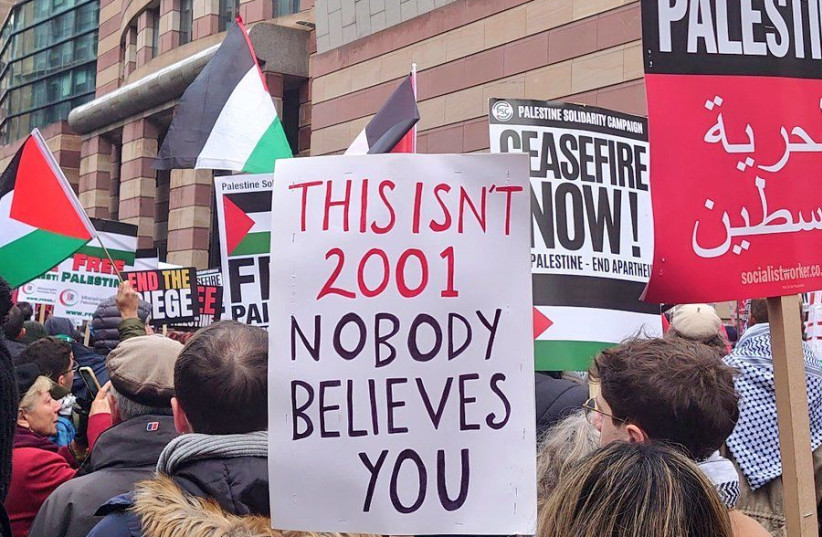Anti-Israel groups are demanding that London law enforcement remove restrictions on a protest this Saturday that will coalesce near a synagogue.
The Metropolitan Police Service, also known as the Met, announced on Thursday it was imposing conditions on a January 18 march to the BBC after discussions with the Palestine Solidarity Campaign on changing the protest route had failed.
“On Tuesday, I wrote to the PSC to inform them that we have reached the view that a protest forming up so close to a synagogue on a Saturday – the Jewish holy day – when congregants will be attending Shabbat services, risks causing serious disruption,” said Met Commander Adam Slonecki.
“We had hoped that the PSC would reflect on our decision and on the likely impact of their plans on the wider community. However, they have said they will not change their position, continuing to encourage protesters to form up in Portland Place.
“In those circumstances, we have no choice but to use the powers available to us. We will continue to engage with the PSC, and we hope they will rethink and put forward an alternative proposal in the coming days.”
Stop the War Coalition and the PSC announced on Friday that over 100 members of parliament, trade union leaders, activists, artists, academics, and journalists had signed a statement condemning the decision to interfere in the democratic scrutiny of a publicly-funded state broadcaster.

The PSC said on Wednesday that it was still in contact with the Met about the march, and its Jewish bloc was seeking a meeting about the police ostensibly only listening to pro-Israel Jews.
Threat to synagogues
The protest coalition organizations on Wednesday rejected claims that its protests were a threat to synagogues, as there had not been any incidents in previous marches, and there was a Jewish bloc within the coalition.
The PSC also denied that the synagogue was along the route of its march to the BBC, which it said was a major institution that deserved criticism for its supposed pro-Israel coverage.
“We firmly reject any attempt to suppress our right to campaign for an end to Israel’s genocidal violence and decades-long violations of the rights of the Palestinian people,” said the PSC.
“It is this and the ongoing complicity of the British government in these crimes that continues to bring people onto the streets in huge numbers. Our marches represent a diverse cross-section of the public, including the Palestinian community, many of whom are relatives of those killed by Israel.”
The group said it still planned to march on Saturday, but the statement did not detail that a new route would be introduced.
The PSC charged that pro-Israel groups, activists, and British Chief Rabbi Ephraim Mirvis had misrepresented the protest to curtail criticism of Israel. Mirvis had issued a rare rebuke of the police in mid-December for failing to address the safety of synagogues in the area of protests.
MPs and peers had also contacted the Met in a joint letter, raising concerns about the protest, but Slonecki said they had communicated their position before the letter, and it had no impact on their decisions.
“We have taken into account the cumulative impact of this prolonged period of protest, often taking place on Saturdays and on numerous occasions in the vicinity of synagogues,” said Slonecki. “We know this has been a cause of increased concern for many Jewish Londoners who have altered their plans, avoided parts of central London, and reduced attendance at religious services.”
Conservative MP Suella Braverman welcomed the Met decision on X/Twitter on Friday but said the restrictions in the face of intense protests had “taken far too long.”
“For over a year, British Jews have lived in fear, and central London has become a no-go zone on weekends,” said Braverman. “For over a year, we’ve seen antisemitism, hatred, and extremism celebrated on our streets.”
The Campaign Against Antisemitism said on Friday that the Met decision was a “start” that should have been implemented a year ago but questioned how strictly the conditions would be enforced.
The CAA asked, “Will those who brandish antisemitic signs and chant antisemitic chants be dealt with?”
